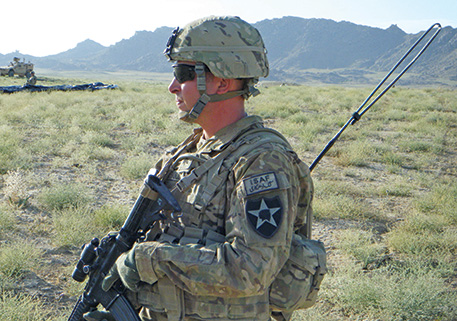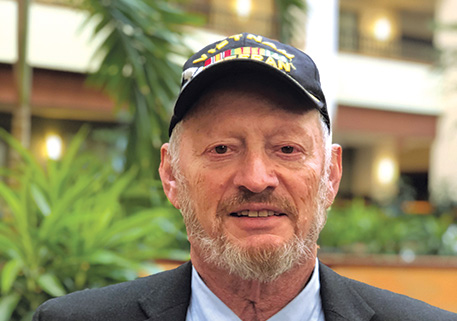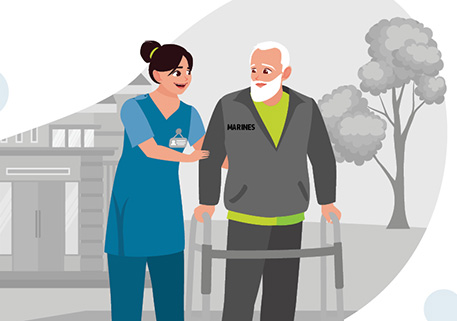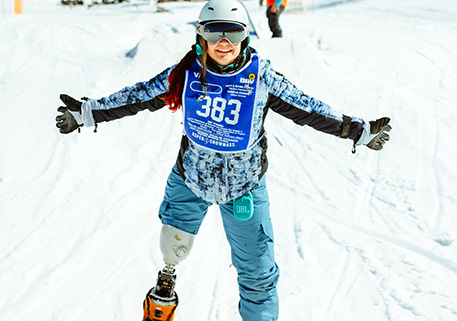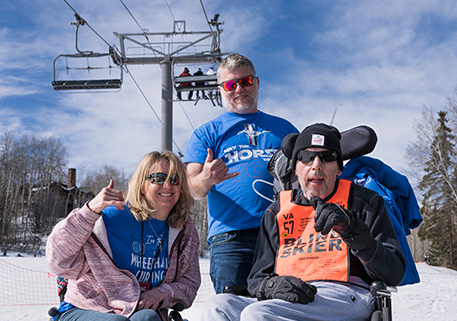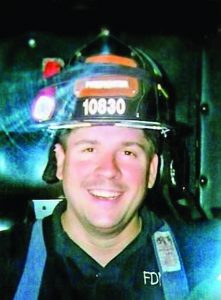
Family looks back on Marine’s life of service
On the morning of Oct. 23, 1983, 21-year-old John Chipura was on his way to his shift as a radio operator at the 24th Marine Amphibious Unit headquarters in Beirut when a suicide bomber drove a truck packed with explosives into the barracks, killing 241 U.S. military personnel.
FBI investigators said that it was the largest non-nuclear explosion since World War II and the most powerful car bomb ever detonated at that time. And for three days following the deadly terrorist attack, Chipura’s family waited for word of his fate, not knowing whether he had made it out alive.
“He was missing to us for three days. For three days, we had no contact, no information, nothing,” said John’s brother, Gerard Chipura. “We thought he was lost, like so many others at that time.”
The family’s congressman, who was in Beirut to assess the scene, encountered his Staten Island constituent and delivered some comforting news to the Chipuras.
“I remember being in our kitchen when he called my mother,” said Gerard. “He said, ‘This is Guy Molinari, your congressman from Washington. I’m in Beirut right now. I have your son here and he’s safe.’ It was a very dramatic moment for us.”
Gerard said that after his brother assisted in recovery efforts and returned home from Beirut, his outlook on life had changed. John had told him he was talking to a friend moments before the bomb went off and had always wondered if he could have done anything differently.
“He always thought that if he talked to that guy for one more minute, maybe he would’ve changed his future,” recalled Gerard. “It was tough for John. But, at the same time, it made him more personable to people, because if he was going to have a conversation with you, he took the time to spend with you and understand who you were.”
Gerard believes John’s experience in Beirut led to his life of service. After receiving an honorable discharge from the Marine Corps, John returned to Staten Island and joined the New York City Police Department. John worked for seven years in the 72nd Precinct and then three years in the Brooklyn South narcotics unit.
“John’s family said he grew up idolizing John Wayne, and joining the Marine Corps was a natural fit,” said National Commander Butch Whitehead. “What he experienced in Beirut was tragic, but he seemingly used that to fuel the fire for a life dedicated to service, something we only see in our nation’s most dedicated heroes.”
After 12 years with the NYPD, John decided to switch things up and follow in his father’s and brother’s footsteps by joining the New York City Fire Department.
“His experience in Beirut affected his world tremendously,” said Gerard. “I think that’s when he decided he wanted to see if he could affect people every day. That became his new normal after experiencing such a horrible disaster.”
“The brave men who died in Beirut made a difference during their too-short but significant lives,” said Marine veteran and DAV National Service Officer Don Inns, a Chipura family friend. “Those of us who survived Beirut have a duty to honor their supreme sacrifice by making a difference. Anything less is to leave our fallen brothers behind.
‘‘‘Chip’ became a beacon of light, leading the charge in this awe-inspiring mission of service,” added Inns. “He had everything to live for and even more that he was willing to die for. In the end, what matters most is the love in the hearts we leave behind.”
Soon, the brothers were assigned to separate firehouses in Brooklyn, only 3 miles apart. Gerard recalls working two shifts alongside his brother, a rarity in a department that size.
“For two brothers to work together on the same shift and do the same job, it’s priceless,” he said.
On Sept. 11, 2001, John was detailed to Ladder 105 in downtown Brooklyn when news of the first World Trade Center attack reached the firehouse. John’s engine responded to the Trade Center at 8:54 a.m.
John and Gerard’s sister, Nancy, worked for the port authority on the 69th floor of Tower 1. Reportedly, John was last seen assisting in the evacuation of Tower 2 as his sister escaped from Tower 1.
“I know John was thinking about my sister in those buildings, knowing he was going to go help,” said Gerard. “His fiancée worked five blocks away, too. So if getting to downtown Manhattan was going to secure his world and the people he loved the most, he was going to get there. He was going to do everything he possibly could. And I thought it was kind of weird that I didn’t get a call from him saying, ‘Hey, come on. We’re going; we’ve got to go as brothers.’ There was none of that. So that’s when I really had a bad sinking feeling that he was going or he was there already.”
As the enormity of the disaster unfolded, the Chipura family started to realize the original list of missing persons contained thousands of police officers and firefighters.
Gerard had been called in as well to assist with the recovery. At 3 the next morning, his shift ended and he headed home to see if he could get any new information about John and his other loved ones who had been in the city.
“When I got [to Staten Island], I found out my sister had escaped; she was home. My wife had been in Midtown Manhattan, she had come home,” he recalled. “John’s fiancée, Gina, she had made it out. So we all just made our way to my house and tried to make heads or tails and figure it out. It was a tremendous, gut-wrenching feeling for me.”
In spring 2002, the Chipura’s were notified of John’s recovery; two bone fragments, part of his hip and part of his calf.
“John was the only recovery from his whole company working that day,” Gerard said. “It was very traumatic for the other families. We still memorialize them all together every year.”
The hunt for identification of remains found at Ground Zero continues today, with more than 1,100 people still unidentified, according to the Office of Chief Medical Examiner in Kips Bay, N.Y.
“They say if you say somebody’s name over and over again every single day, they never really die,” Gerard said. “So that’s what we do. We have done a golf outing for John as a memorial every year for 18 years. Every single year, we put 120 to 140 people on the golf course and think about John for the day.”
In honor of his life, John’s family established the John G. Chipura Foundation. Through the foundation, they are able to help support numerous causes that were important to John, including Boy Scouts, veterans camps and local children.
“We’re not changing the world, but we might just change one life, and that’s a very simple thing that John would do,” said Gerard. “So that’s kind of our mantra. We can’t change the world, but we can help you right now and change the way your life is and just make you smile for one minute.”
Gerard remembers seeing a “Never Forget” banner hanging near Ground Zero shortly after the attack. He said the message he wants for people to embrace isn’t “Never Forget” but “Always Remember.”
“It’s not about never forgetting for me. It’s about always remembering, because it’s always going to be there,” he said. “We have to remember things that have happened, even as tragic as they are.”
Gerard said after John returned from Beirut, he was much more affectionate to people and would stop and say “I love you” more—a lesson he believes fueled his brother’s legacy as a public servant.
“I think he realized that we’re only here for a short period of time, so make every moment count,” said Gerard. “I think John influenced me because he was so positive that it changed me. [After 9/11], I was digging for my fellow firefighters, just like my brother was digging for his fellow Marines 18 years earlier in Beirut. It was very humbling to realize that we had two similar experiences decades apart. I realized I had a purpose to continue serving people and with John’s memory inside of me.”
“We owe a debt of gratitude to the entire Chipura family for the selfless sacrifices they made in service to our country. Nor can we forget the heroism it inspired,” said Whitehead. “That day changed the world and altered the paths of so many lives. It took me to Iraq and led me to DAV. It’s hard to believe nearly 20 years have passed. We absolutely cannot forget the sacrifices made that day by people like John and his family or those who were called to serve after. An entire generation of veterans—many of whom became seriously ill or injured as a result of their post-9/11 service—has been relentlessly serving in various capacities ever since.”


